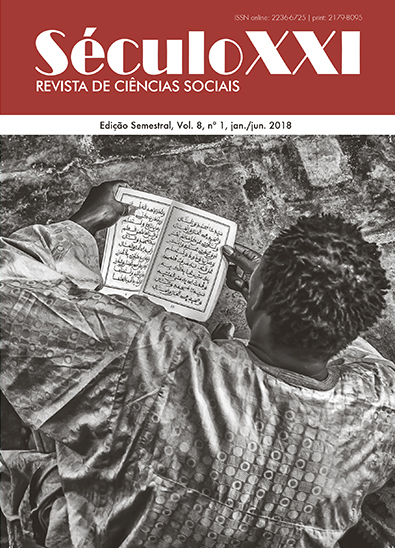Eligibility of asylum claims based on sexual orientation in Brazil
DOI:
https://doi.org/10.5902/2236672535668Keywords:
Asylum, Sexuality, Brazil, Eligibility, UNHCRAbstract
From the 1980s, some countries have started to grant asylum to applicants who had the well-founded fear of being persecuted in their countries of origin due to their non-heterosexual sexualities. It has been happening in Brazil since 2002. The objective of this paper is to analyze the eligibility of asylum claims based on sexual orientation in Brazil, that is, to try to understand which questions are taken into consideration during the process that ends with the grant or the denial of the refugee status. Apart from specific bibliography consulted, some interviews were conducted with expert lawyers and with UNHCR’s and CONARE’s staff. The Brazilian government does not require that the applicant’s country of origin criminalizes homosexuality in order to grant asylum to non-heterosexual claimants. Persecutions may have been committed by non-State actors; however, it seems that the government does not have a clear policy of how to check the well-founded fear of persecution in the country of origin. Concerning credibility assessment of the asylum seekers’ narrative, Brazil shows a very interesting policy because of the self-identification criterion relating to sexual orientation; at the same time, stereotypes and Western conceptions may influence the decision in a negative way.
Downloads
References
ACNUR. Diretrizes sobre proteção internacional n. 01. Perseguição baseada no Gênero, no contexto do Artigo 1A(2) da Convenção de 1951 e/ou Protocolo de 1967 relativos ao Estatuto dos Refugiados. 2002a. Disponível em: http://www.acnur.org/fileadmin/Documentos/BDL/2014/9738.pdf?view=1. Acesso em 22 de novembro de 2016.
ACNUR. Diretrizes sobre proteção internacional n. 02. “Pertencimento a um grupo social específico” no contexto do Artigo 1A(2) da Convenção de 1951 e/ou seu Protocolo de 1967 relativos ao Estatuto dos Refugiados. 2002b. Disponível em: http://www.acnur.org/t3/fileadmin/Documentos/BDL/2014/9741.pdf?view=1. Acesso em 22 de novembro de 2016.
ACNUR. Guidance note on refugee claims relating to sexual orientation and gender identity. 2008. Disponível em: http://www.refworld.org/docid/48abd5660.html. Acesso em 22 de novembro de 2016.
ACNUR. Diretrizes sobre proteção internacional n. 09. Solicitações de Refúgio baseadas na Orientação Sexual e/ou Identidade de Gênero no contexto do Artigo 1A(2) da Convenção de 1951 e/ou Protocolo de 1967 relativo ao Estatuto dos Refugiados. 23 de outubro de 2012. Disponível em: http://www.acnur.org/t3/fileadmin/Documentos/BDL/2014/9748.pdf?view=1. Acesso em 22 de novembro de 2016.
AGIER, M. Encontros etnográficos. Interação, contexto, comparação. 1. ed. São Paulo: Editora Unesp; Alagoas: Edufal, 2015.
ANDRADE, V. L. Refúgio por orientação sexual no Brasil: perfil das solicitações nas cidades de Brasília/DF e São Paulo/SP. Revista do Núcleo de Estudos e Pesquisas em Gênero & Direito (UFPB), v. 5, p. 1-24, 2016.
ANDRADE, V. L. Imigração e Sexualidade: solicitantes de refúgio, refugiados e refugiadas por motivos de orientação sexual na cidade de São Paulo. 2017. 238 p. Dissertação (Mestrado em Antropologia Social) – Universidade Federal de Santa Catarina, Programa de Pós-Graduação em Antropologia Social, Florianópolis, 2017.
BRASIL. Presidência da República. Casa Civil. Lei n. 9.474, 22 de julho de 1997. Define mecanismos para a implementação do Estatuto dos Refugiados de 1951. Brasília, DF, 1997.
CARLINO, R. Objectivity, authority, and truth: confirming a homosexual identity in lesbian and gay fights for asylum. Peace Studies 2010 Conference. Disponível em: file:///C:/Users/Windows%207/Downloads/grinnell-168.pdf. Acesso em 22 de novembro de 2016.
DÍAZ LAFUENTE, J. Estudio de la doctrina jurisprudencial española sobre la protección internacional por motivos de orientación sexual e identidad de género. In: FABADO, Isabel (org.). Libertad de circulación, asilo y refugio en la Unión Europea. Valencia: Tirant lo Blanch, 2013.
DÍAZ LAFUENTE, J. Asilo y refugio por motivos de orientación sexual e identidad de género. Madrid: Cuadernos del Congreso de los Diputados 14, 2016.
FASSIN, D. The Precarious Truth of Asylum. Public Culture, v. 25, n. 1, p. 39-63, 2013.
JANSEN, S.; SPIJKERBOER, T. Fleeing Homophobia. Asylum claims related to sexual orientation and gender identity in Europe. COC Netherlands and VU University Amsterdam. Setembro de 2011.
JUBILUT, L. O Direito internacional dos refugiados e sua aplicação no ordenamento jurídico brasileiro. São Paulo: Editora Método, 2007.
LEÃO, R. O reconhecimento dos refugiados pelo Brasil – decisões comentadas do CONARE. ACNUR Brasil e CONARE, 2007.
MOREIRA, J. Refugiados no Brasil: reflexões acerca do processo de integração local. REMHU – Rev. Interdiscip. Mobil. Hum., Brasília, ano XXII, n. 43, p. 85-98, 2014.
OLIVA, T. Minorias Sexuais enquanto 'Grupo Social' e o Reconhecimento do Status de Refugiado no Brasil. Brasília: ACNUR Brasil (Diretório de Teses de Doutorado e Dissertações de Mestrado do ACNUR), 2012.
ORAM (Organization for Refugee, Asylum & Migration). Testing Sexual Orientation. A scientific and legal analysis of plethysmography in asylum & refuge status proceedings. Dezembro de 2010.
PRINCÍPIOS DE YOGYAKARTA. 2007. Disponível em: http://www.clam.org.br/pdf/principios_de_yogyakarta.pdf. Acesso em 22 de novembro de 2016.
VENTURI, D. Reflections on empirical research with LGBTI refugees – a legal scholar’s perspective. Oxford Monitor of Forced Migration, v. 6, n. 2, p. 20-21, 2017.
Downloads
Published
How to Cite
Issue
Section
License
Authors who publish in this journal agree with the following terms:
1. Authors keep the copyrights and allow the journal the right of first publishing, having the paper simultaneously licensed by Creative Commons Attribution License that allows the sharing of the article – copyright recognized - and first publishing in this journal.
2. The journal is allowed to require the copyrights transfer, allowing the article to be used under noncommercial purposes, including the right to send the paper to Free Access or Paid databanks, not assuming the obligation to pass on the value charged from users to the authors.
3. Authors are allowed to take additional contracts separately for nonexclusive distribution of the paper’s version published in this journal (e.g. publishing in institutional repository or as book chapter), recognizing the copyright and first publishing in this journal.







